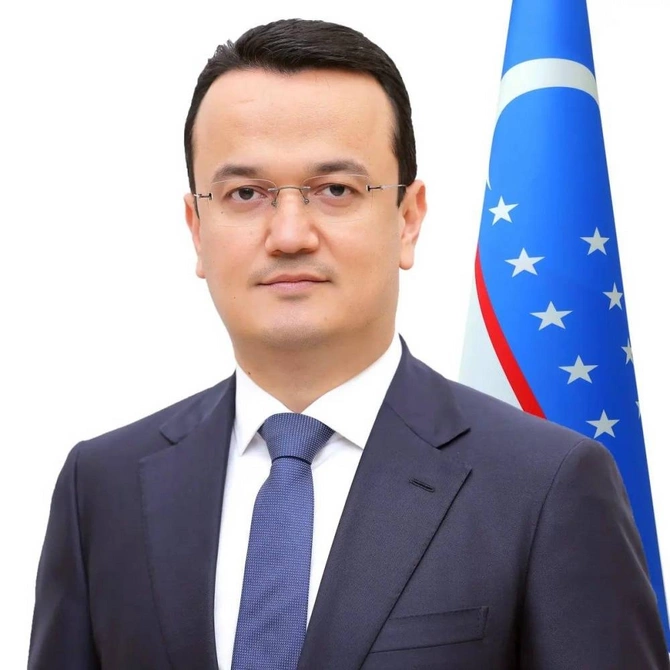
The partnership between Uzbekistan and Qatar fosters a safe investment environment, grounded in political stability and shared economic objectives. This relationship bolsters Uzbekistan’s economic resilience in Central Asia.
Photo: aktau.kz
Laziz Kudratov, Uzbekistan's Minister of Investment, Industry, and Trade, highlighted in an interview with Gulf Times the accessibility of the country's investment and economic opportunities for Qatari investors. He pointed out that strategic reforms, abundant resources, a young workforce, and investor-friendly policies are creating a favorable environment for high-quality projects, The Caspian Post reports citing Gulf Times.
The minister praised Qatar’s developmental progress in various commercial, industrial, and economic sectors, acknowledging that they had positioned the country as a leading regional growth hub.
Gulf Times met with Minister Kudratov during his official visit to Doha, where he addressed key topics and queries raised by Qatari investors. The minister provided a clear vision of the investment climate in Uzbekistan, including the legal guarantees in place, investor’s various real estate options, as well as the country’s attractive tax incentives, and its infrastructure needs.
The minister shared critical insights on the economic and investment opportunities available to Qatari investors in Uzbekistan. He further observed that, over the past decade, Uzbekistan has emerged as a regional leader economic growth and a model of political stability, with its potential only increased by its status as the most populous nation in Central Asia.
Kudratov outlined ten key reasons why Uzbekistan ranks as a prime destination for foreign investors in Central Asia.

Political stability
How does the strategic partnership between Uzbekistan and Qatar enhance investment stability?
The partnership between Uzbekistan and Qatar fosters a safe investment environment, grounded in political stability and shared economic objectives. This relationship bolsters Uzbekistan’s economic resilience in Central Asia.
According to the World Bank, Uzbekistan boasts the fastest-growing economy in the region, despite challenges such as inflation and geopolitical tensions. This robust economic foundation has strengthened investor confidence in long-term projects across Uzbekistan’s various emerging sectors.
Legal framework
Are there laws protecting private ownership? Does the state recognise international arbitration?
Uzbekistan boasts a comprehensive legal framework that ensures strong protection of private ownership and supports international arbitration laws. The country’s accession to international arbitration agreements, as well as recently completed reforms together enable foreign investors to resolve disputes transparently. Operating in the country is the Tashkent International Arbitration Center (TIAC). The Center works under the 2021 International Commercial Arbitration Law and is also compliant with the UNCITRAL Model Law. Arbitrators of the TIAC can operate without local law licenses, and TIAC’s decisions are enforceable globally under the New York Convention. TIAC conducts multilingual and online arbitrations. Some key incentives include zero administration fees, a strategic partnership with Hong Kong International Arbitration Centre, and specialised rules for technology disputes.
This legal commitment positions Uzbekistan as a reliable investment hub, complemented by proactive growth strategies and legal reforms that ensure stability and security for Qatari investors.
Economic growth
Could you outline Uzbekistan’s economic growth and infrastructure development needs, particularly for public-private partnerships?
Uzbekistan’s economy is the fastest-growing in Central Asia, with a projected growth rate of 6% in 2024, despite regional economic slowdowns. This resilience is driven by significant foreign investments, a rapidly developing services sector, and a shift toward diversified development.
Infrastructure modernisation, especially through public-private partnerships, offers abundant opportunities in sectors such as transportation, energy, and urban development. Uzbekistan remains committed to public-private partnerships, viewing them as essential for improving public services and attracting much-needed investment and expertise. The country has experienced significant growth in PPP projects, with over 400 infrastructure initiatives, valued at approximately $16bn, either completed or in progress. This reality marks a major change, and demonstrates the pace of the country’s economic transformation, given the lack of private sector involvement in such projects before 2018.
Currently, PPPs exist in various sectors including energy, healthcare, and education, with an expected mobilisation of around $700mn. Additionally, several projects in energy, healthcare, and the chemicals sector have already been completed, with a total anticipated mobilisation exceeding $1.8bn.
Uzbekistan plans to expand its PPP efforts into sectors such as irrigation, transport, power distribution, and communal services, all of which have historically experienced underinvestment and operational issues. To accelerate the implementation of PPPs, the country needs to streamline project development, speed up approvals, and simplify land acquisition processes.
Looking to the future, Uzbekistan’s ambitious Strategy 2030 targets $30bn in private sector mobilisation before the decade’s end. These initiatives serve as a cornerstone for the country’s growth goals, making Uzbekistan a key destination for Qatari investments in sustainable infrastructure.
Demographics
Why is Uzbekistan’s young and active population attractive to investors?
With over 60% of its population under 30, Uzbekistan’s youth are a major driver of consumer demand and economic growth. Rising wages, remittances, and government payments amplify this demand for high-quality products and services, creating opportunities in sectors like technology, retail, and education. Uzbekistan is a young country, full of the dynamism and energy of youth.
What’s more, the almost 6.5mn kids today attending Uzbekistan’s high schools are gaining from an increasingly sophisticated STEM education, and a million are benefitting from further training at one of the country’s 209 higher educational institutions, priming the country’s next generation for a critical role in the global economy of tomorrow.
The World Bank emphasises the importance of education reforms to align with labour market needs. Uzbekistan’s efforts to enhance education outcomes and workforce competitiveness are critical planks supporting long-term productivity and investor confidence.
Geographic location
How can investors benefit from Uzbekistan’s proximity to Qatar and access to key markets?
Strategically located in Central Asia, Uzbekistan serves as a gateway to major markets in the CIS, China, and South Asia. The country’s established trade routes provide an ideal foundation upon which Qatari companies can establish and expand operations.
The proximity between Uzbekistan and Qatar further enhances trade relations and transportation links, solidifying Uzbekistan’s role as an economic hub in the region.
Natural resources
What opportunities are available in sectors such as natural gas, gold, and copper?
Uzbekistan’s wealth of natural resources offers lucrative opportunities for investment in natural gas, gold, copper, uranium, and other essential minerals. Possessing the world’s fourth-largest gold reserves, Uzbekistan ranks as the seventh largest producer globally, and the country’s Muruntau mine is among the largest gold mines operating today.
Furthermore, Uzbekistan possesses among the world’s largest reserves of uranium, as well as an abundance of strategically important metals such as copper, zinc, lead, tungsten and molybdenum. That’s before you consider Uzbekistan’s leading renewables potential, with abundant wind and solar resources to drive the energy transition, both in the region and beyond. Government support for foreign investment in mining and energy is ensuring growth and stability in these sectors.
As global demand for critical minerals rises, Uzbekistan’s natural resources sector will further establish itself as an economic cornerstone and an attractive investment avenue for Qatar.
Human capital
What distinguishes Uzbekistan’s workforce in terms of skills and historical achievements in science?
Uzbekistan’s workforce benefits from a strong historical legacy of excellence in science and mathematics, fostering a culture of innovation. Current education reforms prioritise STEM skills to meet labour market demands in a diverse economy.
Aligning education quality with market needs ensures ongoing competitiveness and positions Uzbekistan’s workforce as a valuable asset for high-value sectors, including those targeted by Qatari investors.
Ease of doing business
What measures has Uzbekistan implemented to simplify business registration and banking processes?
Uzbekistan has made significant strides in simplifying business registration and banking procedures, reflecting its commitment to fostering a business-friendly environment. Investors can establish and operate businesses swiftly, as regulatory simplifications enhance the country’s appeal as Central Asia’s pre-eminent emerging market. Since 2017, the entire business registration process can be completed within 30 minutes from the moment of application to final submission. An investor can register a business both in person and online. These ease-of-doing-business efforts align with recent World Bank economic updates, which emphasized the role of legal and economic reforms in driving growth.
Open real estate market
What opportunities do Qatari investors have in acquiring land and properties in Uzbekistan?
Uzbekistan’s open real estate system allows foreign investors, including Qataris, to purchase commercial and residential properties. This openness supports investments in hospitality, tourism, and retail sectors.
Legal entities in Uzbekistan may hold land plots through various rights, including permanent ownership, permanent use, fixed-term use, lease, and ownership. Non-residents can’t own land plots. However, non-residents may lease land plots.
With Uzbekistan’s growing reputation as a cultural and tourism hub, its real estate market presents significant investment potential, further bolstered by ever-growing numbers of visitors.
Government incentives
What tax exemptions and incentives does Uzbekistan offer, particularly in industry and hospitality?
Uzbekistan offers a comprehensive set of mechanisms and provisions to attract foreign capital and stimulate economic development. Key tax incentives include reduced corporate income tax rates, which vary depending on the size of the investment, the sector of the economy involved, and the location of the enterprise. Investors operating in Special Economic Zones (SEZs) can benefit from exemptions on property tax, land tax, and water use tax, provided they meet certain conditions, such as producing export-oriented goods and prioritising local labour.
Additionally, customs benefits are available, including exemptions from duties on imported goods for enterprises with foreign participation or significant investment levels, as well as for certain categories of goods and equipment. Specific regional incentives offer significant tax reductions for businesses operating in areas such as the Fergana region and the Republic of Karakalpakstan, which are targeted for socio-economic development.
These measures align with the country’s vision for economic diversification, providing Qatari investors with attractive incentives and support to participate in Uzbekistan’s exciting development journey.
Uzbekistan has been actively working to promote its hospitality and tourism sector through various tax exemptions and incentives. These measures are designed to attract foreign investment, encourage the development of hotels and related services, and enhance the overall tourism infrastructure. Here are some key tax exemptions and incentives that have been provided in Uzbekistan’s hospitality sector:
1. Tax holidays: New hotels and other tourism-related enterprises may be eligible for significant tax holidays. For instance, businesses might be exempt from property tax or land tax for a certain period, typically up to several years.
2. Reduced tax rates: Certain taxes may have reduced rates for enterprises in the hospitality sector, particularly for those that meet specific criteria related to investment amounts or job creation.
3. Value Added Tax (VAT) exemptions: Some services within the hospitality industry may be exempt from VAT, making it more attractive for investors and operators.
4. Customs duty exemptions: Companies investing in the construction of hotels or other tourist facilities may benefit from customs duty exemptions on imported equipment, materials, and technologies necessary for their operations.
5. Investment incentives: Uzbekistan offers various incentives to foreign investors in tourism-related projects, which can include guarantees against nationalisation or expropriation and favourable terms for profit repatriation.
6. Support for infrastructure development: The government often provides support for infrastructure development (such as roads, public transportation systems) that benefits the hospitality industry as part of broader economic development goals.
7. Special economic zones: Certain areas in Uzbekistan are designated as special economic zones (SEZs) with additional benefits such as further tax reductions or simplified administrative procedures aimed at boosting tourism investments.
8. Grants and subsidies: In some cases, the government may offer grants or subsidies to support specific projects aimed at enhancing tourism facilities or promoting cultural heritage sites.
To stay updated on the latest changes in policies regarding tax exemptions and incentives in Uzbekistan’s hospitality sector, it is advisable to consult local legal experts or government resources as these policies can evolve over time based on economic conditions and government priorities.
Share on social media
The partnership between Uzbekistan and Qatar fosters a safe investment environment, grounded in political stability and shared economic objectives. This relationship bolsters Uzbekistan’s economic resilience in Central Asia.